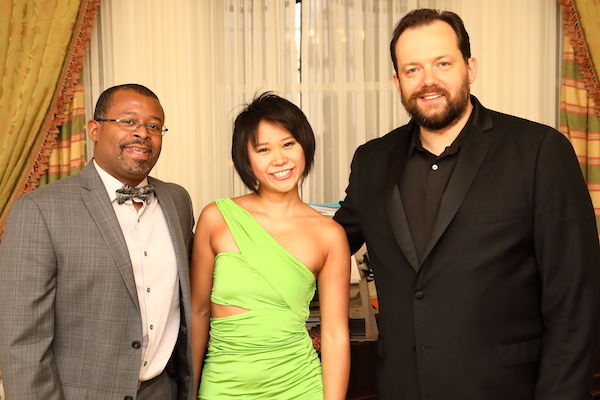Nelsons, Boston Symphony find the divine in Lee’s “Sukkot”

As a Seventh-day Adventist, composer James Lee III belongs to a church that views Christ’s second coming literally: As told in Revelation, the Messiah will return to earth on a cloud, saints will follow, and a New Jerusalem heralded by celestial trumpets will be established from heaven.
That is the vivid scene captured in Lee’s Sukkot Through Orion’s Nebula, which Andris Nelsons and the Boston Symphony Orchestra offered as part of a wide-ranging program at Symphony Hall on Thursday night.
Following the example set by Olivier Messiaen, who channeled his Catholic mysticism into many scores, Lee draws upon his faith for inspiration. Sukkot paints glorious scenes of the Feast of Tabernacles as told in the Old Testament as well as prophecies of Christ’s return through driving rhythms, colorful sonorities, and passages of sweeping lyricism.
Leading with brisk gestures, Nelsons guided the orchestra through a performance that was well attuned to the work’s many details. His tempos kept the music pulsing ever forward, and his swift charting of Lee’s shifting meters injected a sense of urgency into the reading.
The ten-minute score opens with a percussive burst flowed by shofar-like calls in the French horn and trumpets, which come to rest on stinging dissonances. At the work’s center, a lyrical theme cast high in the violins paints a serene picture. But the music never quite settles, as percussion figures supply a frenzied backdrop suggestive of the excitability of witnesses anticipating the second coming. Fanfares return at the end to bring Sukkot to a resolute conclusion.
With his fine ear for orchestration and texture, Michigan-born, Baltimore-based Lee teaches music at Morgan State University and has penned a number of scores popular with small regional and college orchestras. Sukkot, completed in 2011, is attracting higher-profile ensembles. Next month, Thomas Wilkins, conductor of the BSO’s Youth and Family concerts and a champion of Lee’s music, will lead the same work with the Cincinnati Symphony Orchestra.
Nelsons’s bold advocacy of Sukkot on Thursday was another step toward this young American composer finding the wide attention he deserves. The audience on Thursday showered a visiting Lee with generous applause when he took the stage for bows.
The energy and panache invested in Sukkot was also present in Thursday’s performance of Shostakovich’s Piano Concerto No. 1 in C minor, which spotlighted Yuja Wang as soloist.
Recent seasons have witnessed Wang performing well-trodden concertos with mixed results. Her performance in February of Schumann’s Piano Concerto yielded more flash than substance. But Shostakovich’s first piano concerto — with its parodies of classical, romantic and jazz elements — proved a fine vehicle for her brazen style.
Wang tore through the cascading runs of the first movement with live-wire intensity. Her fleet tempos there and in the finale made for a truly athletic spectacle as she rendered the passages with clarity and precision. Yet Wang never lost sight of the sly wit that Shostakovich etched onto every page, and the concerto’s jazzy episodes coursed humorously under her fingers.
The inner movements brought searching intimacy. Shaping each phrase with generous rubato, Wang found all of the melancholy and mystery. Her cadenza — a quote from Beethoven’s Rondo a capriccio in G — briefly tilted the music towards light.
The concerto features solo trumpet almost as much as piano, and Wang had a superb partner in BSO principal trumpeter Thomas Rolfs. With gleaming tone, Rolfs complemented Wang’s every phrase, tossing off bright fanfares to add zest to the outer movements. His solo theme in the second movement soared effortlessly over the strings.
Nelsons led the orchestra with brisk tempos that still allowed Wang and Rolfs lots of expressive space. The strings, by turns dark and brooding, likewise supported the duo with an accompaniment well attuned to the exuberance and lyricism that marked this performance. Wang’s encore, Vincent Youman’s arrangement of Art Tatum’s Tea for Two, provided a suave and dazzling complement.
The second half of the concert featured highlights from Czech composer Bedřich Smetana’s symphonic poem collection, Má Vlast.
The popular Vltava (The Moldau) set the course for Thursday night’s musical trek through pastoral Bohemia. Nelsons proved an insightful guide, leading with relaxed tempos that steered the trickling woodwind passages of the introduction into a whirlpool of sound. The main theme, punctuated with subtle accents on the repeat, brought sudden lilt, and the ensuing polka — a scene of a rustic wedding celebration — moved with apt swagger.
In From Bohemia’s Woods and Meadows, Nelsons spun long lines from the undulating string figures and woodwind melodies. The fugue was handled gracefully as it expanded from silvery violin to full orchestra.
Nelsons built the Hussite hymn that opens Blaník into bold statements before he settled into the softer passages of score. The woodwind and horn lines brought rustic reverie when called upon, and John Ferrillo’s oboe solo offered a brief moment of solace in a reading marked for both detail and a sense of grandeur.
The program will be repeated 1:30 p.m. Friday and 8 p.m. Saturday at Symphony Hall. bso.org; 888-266-1200
Posted in Performances





Posted Oct 17, 2019 at 4:12 pm by Patricia Autrey
I want to hear this! Sounds wonderful. Is this available on CD?